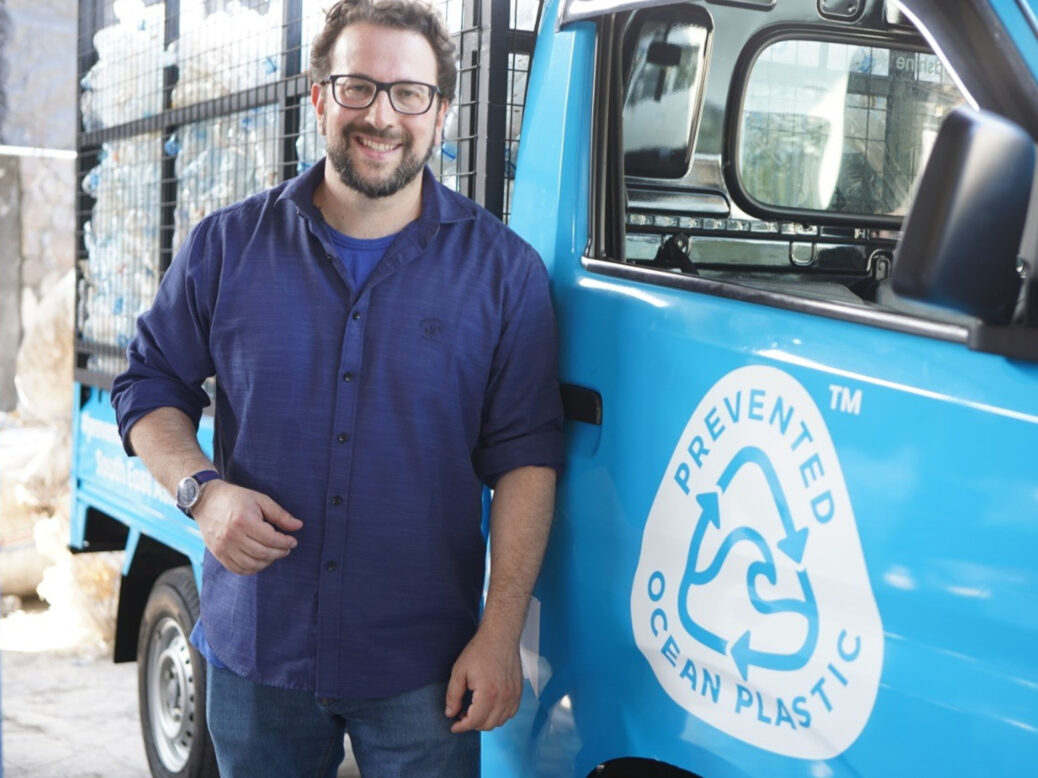
Raffi Schieir is the co-founder and director of Prevented Ocean Plastic, a company that produces recycled plastic – using waste collected from coastal areas at risk of ocean plastic pollution – which is then supplied as product packaging for brands and supermarkets. He is also the director of Bantam Materials Ltd, a company dedicated to collecting and recycling bottles from oceans and coastal areas. Previously, he worked at the Royal Bank of Canada.
How do you start your working day?
I’m an early riser and usually wake up naturally about ten minutes before my 6am alarm. I savour the peace and quiet and like to do a small push of work after getting up. My early starts mean I also get to check in with colleagues and friends who are working seven hours ahead in Asia. Then, at around 7.30am, I wrap up those initial conversations and have my shower and coffee before leaving for the office. I’m really lucky to be able to walk into work, especially during the warmer months, and I’m usually at my desk at around 8.30am to start the working day with the rest of the team.
What has been your career high?
A definite career highlight for me was when we invested in and built the first Prevented Ocean Plastic collection centre from scratch in Bali, Indonesia. The first collection centre enabled us to process over 60,000 tonnes per year of otherwise uncollected plastic from the at-risk region. We got to see the sign go up, bottle collectors working in high vis and the highest safety measures put in place. We began our mission to open 25 new high-capacity collection centres by 2025 and from the first opening in Bali, we received financing and international attention. It was all possible, due to entrepreneurial risk, to build something far away that was desperately needed – but without any guarantees that it would be as successful as it was.
What has been the most challenging moment of your career?
For me, it’s been getting everyone, both internally and externally, to align and understand that we need to generate value for stakeholders across the supply chain. In our efforts to create value at the grassroots level up to the brand level, we often have to contend with a lot of self-interest – as people seek to prioritise how purchase orders might affect their personal income instead of focusing on getting the best value for stakeholders throughout the entire value chain. It’s no easy feat getting everyone part of a big, complex, international supply chain to agree on everything – but it’s also a useful tool to remind everyone of our stakeholder commitments.
If you could give your younger self career advice, what would it be?
I’d remind my younger self to be steadfast and push through with the vision. You need to be just as headstrong as those in the world who are willing to do the wrong thing and keep pressing and believing in doing the right thing. You can’t take no for an answer!
Which political figure inspires you?
Given the current state of the world, I really struggle to find a political figure that inspires me these days. For me, inspirational figures are those who are willing to navigate the right path towards growth and change. Unfortunately, we don’t see enough of that. Increasingly we have politicians pushing agendas that don’t have the vision to capture what society really needs to move forward, both socially and environmentally. Inspiration is so powerful, though, so I’m optimistic that in future we will have more political figures we can get behind and trust to put people and planet first – because we need that more than ever.
What policy or fund is the UK government getting right?
The UK government is close to getting the Plastic Packaging Tax right. They’re cognisant that there needs to be greater emphasis on recycled plastics, so they instigated a tax for companies who choose not to use recycled plastics. Currently, there is a £200 fine per tonne of virgin plastic that companies use. But the current tax isn’t quite there yet. The government collected more money than projected, showing that businesses are still finding it more cost-effective and convenient to pay the tax and purchase virgin plastic rather than going with a recycled alternative. To really shift the needle and incentivise companies to choose recycled and support the circular economy, the fine needs to be doubled, or tripled, so that it’s no longer cheaper to use virgin plastic and pay the fines.
And what policy should the UK government scrap?
For me, the government needs to be very careful and rethink any subsidies it’s giving to export our waste to poorer nations. Instead, they need to focus on creating the infrastructure for us to process our own waste, or support and invest in creating infrastructure in these poorer countries.
What upcoming UK policy or law are you most looking forward to?
It’s not necessarily a particular law or policy that I’m looking forward to, but the increasing emphasis on sustainability in the UK. The UK is leading in encouraging consumers to make more environmentally positive choices and celebrating sustainability successes. We were lucky enough to be at the Houses of Parliament in November to receive the Green World Award for environmental best practice and we can see the UK applauding initiatives tackling the climate crisis and attaching an element of prestige to them. I’m looking forward to climate positivity becoming even more mainstream and celebrated.
What piece of international government policy could the UK learn from?
What we need to see is the international and UK banking systems provide more green loans. We need lower interests and better terms and conditions for companies that are pushing forward circularity and sustainability throughout their businesses. To see real change, these companies need to be afforded more advantageous financial terms, compared to oil, gas and tobacco companies, for example. Hopefully, then they will be able to communicate to investors out there that it’s not just the rate of return that is important, but investing in companies that will have a positive impact on the planet and people.
If you could pass one law this year, what would it be?
I would like to see more laws concerning Extended Producer Responsibility (EPR). EPR requires producers to pay the full costs of managing and recycling the packaging waste they produce throughout their supply chain. Big companies and brands must start taking financial responsibility for the packaging and products they put out into the world. These materials need to be collected, recycled and given a second life, and, most importantly, the collectors need to be treated properly to facilitate the just transition throughout supply chains. We need more stringent requirements put on these big corporates.




